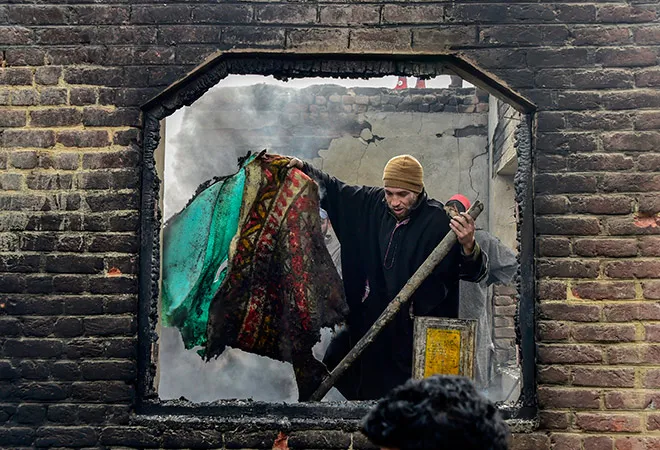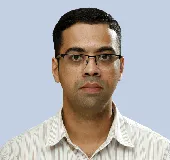
Mr. Amit Shah-led Home Ministry of the Modi 2.0 government has hit the ground running to integrate the state of Jammu & Kashmir (J&K) with mainstream India. In a sense, the Modi-Shah duo is simply attempting to implement the constitutional mandate the Home Ministry is supposed to carry out by linking the farthest corners of the country and maintaining order in conflict-riddled areas. With the country’s paramilitary forces and intelligence apparatus at its disposal, the Home Ministry under Shah seems aggressive enough to implement what the BJP promised in its manifesto, the Sankalp Patra (document of determination).
While the first Modi administration dealt with terrorism in Kashmir with an iron fist, it dragged its feet when it came to political engagement. Presently, with the BJP President and its chief election strategist Amit Shah in charge of Home Affairs, it will be quite interesting to see whether New Delhi continues with its aggression or tries to gain some balance between its all-out military operations and political engagements. Which aspect will have priority over the other would depend on two factors.
The Modi-Shah duo is simply attempting to implement the constitutional mandate the Home Ministry is supposed to carry out by linking the farthest corners of the country and maintaining order in conflict-riddled areas.
First factor would be New Delhi’s policy of dealing with the ecosystem of radicalisation and extremism in the Valley. The past five-odd years have seen an intense wave of jihadi radicalisation in Kashmir — the proof of which, is the youth volunteering for suicide missions, the families of slain terrorists endorsing their acts of violence, massive local support to terrorist groups and growing adoption of the Middle East-style of dressing. This trend has raised serious questions about what is happening in Kashmir at social and cultural levels. This, in no way, is Tehreek (separatist movement).
For instance, Fardeen Khanday — the 16-year-old suicide bomber, Adil Ahmad Dar — the Pulwama suicide attacker, Zakir Musa — the head of Ansar Gazwat-ul Hind and many others, who either committed acts of suicide terror or advocated Islamisation of the Valley, fall outside the Aazadi argument. Their actions indicate the spread of a larger Islamist movement in the South Asian region, which primarily needs to be dealt with internally i.e. inside Kashmir — before it can be addressed with the neighbourhood countries. Dealing with Pakistan-sponsored terrorists and finances coming from the Arab Gulf would require concerted and coordinated efforts by the top-four ministers of the Modi government. However, countering the support the radicals receive from other parts of India would require the Home Minister to be vigilant about the interactions between radicals from the Valley and in other parts of the country. In the backdrop of the increasing influence of Islamic State (IS) in the subcontinent, IS modules being busted in the states of Punjab and Uttar Pradesh and connections being established with J&K, the task cut out for Amit Shah is very clear.
Dealing with Pakistan-sponsored terrorists and finances coming from the Arab Gulf would require concerted and coordinated efforts by the top-four ministers of the Modi government. However, countering the support the radicals receive from other parts of India would require the Home Minister to be vigilant about the interactions between radicals from the Valley and in other parts of the country.
Reports indicate that multiple sources from Pakistan, other foreign nations and local arrangements have been funding terror activities, street violence and separatists in the Valley. Selected mosques are also being funded to subvert locals and run social media campaigns. In the second half of its previous administration, the Modi government laid the foundation by acting against the terror financiers, which has been carried forward by in its second term too. The process needs to be taken to the next level and expanded by weeding them out of Kashmir’s socio-political system. The new government has shown such intentions by arresting three separatist leaders in different terror funding cases. However, the government should now take all such ongoing investigations to their logical conclusions and expose the real perpetrators of terror before the Kashmiri society.
The Home Ministry has additionally issued a hit list of top 10 terrorists from top four terror groups operating in the Valley. However, as has been witnessed in the past five years, mere elimination of terror commanders will not pay any long-term dividends. If history of terrorism in Kashmir has taught us anything, the fallen terror commanders have been used as a currency to keep radicalising the Kashmiri society and churn out new terror recruits.
Second, the onus is equally on the Valley to introspect on where it has gone wrong and the direction its political leadership would give to the Kashmiri society. The current situation in Kashmir is a result of political bickering, blackmailing and the Kashmiri society behaving like an ostrich. For a very long time, the conflict in Kashmir has been dubbed as a political issue between New Delhi and Srinagar, but besides mere political grandstanding, little has been done to address the issue politically. While New Delhi has adopted a militarist approach, Srinagar has not only shied away from discussing contentious constitutional matters, but indulged in political blackmailing. The narrative drawn by the leaders of the PDP and NC, that Kashmir’s ties with India will be severed if Article 370 and 35A are scrapped, is just one of the preposterous examples of foul play in the perception management game. Srinagar can’t force the Kashmiri society to live in a ghetto — camouflaged by the cocoon of constitutional provisions. Srinagar must gear up to debate the contentious constitutional issues and be prepared to give up its political hegemony it enjoys over the other two provinces — Jammu and Ladakh.
Dealing with the issues of special status and redrawing J&K’s political map through the process of delimitation would also pave the way for addressing Pakistan Occupied Kashmir (PoK) and China’s policies on Kashmir — issues that have been ignored for far too long.
Dealing with the issues of special status and redrawing J&K’s political map through the process of delimitation would also pave the way for addressing Pakistan Occupied Kashmir (PoK) and China’s policies on Kashmir — issues that have been ignored for far too long. Therefore, the BJP-led government will have to walk the tightrope and act on its election manifesto — its Sankalp Patra — which explains its long-term strategy for dealing with the Kashmir conflict internally. Such a move will see local politicians peddling the demography and Hindutvawad arguments and conveniently ignore the larger aim of merging Kashmir to the central Indian identity — further pushing — especially the Kashmir Valley, against the wall.
The timing Modi 2.0 would choose to debate the constitutional provisions would determine the future course violence of and extremism in the Valley. With the overwhelming mandate that the BJP has received, New Delhi is best placed to engage the Valley in a constructive dialogue, while the latter has the best opportunity to ask the Modi-Shah duo to walk the talk of gaining ‘Sabka Vishwas’ (Winning confidence of all). Having said that, the Valley, too, would need to create a conducive environment — allowing New Delhi to work for ‘Sabka Saath, Sabka Vikas’ (collective effort, inclusive growth). Kashmir and its political leadership must not hold the entire state and the country hostage. Upholding integrity of the country’s Constitution would test New Delhi’s Raj Dharma (duties of the king) and Srinagar’s Rashtradharma (duty towards the nation).
The views expressed above belong to the author(s). ORF research and analyses now available on Telegram! Click here to access our curated content — blogs, longforms and interviews.




 PREV
PREV


